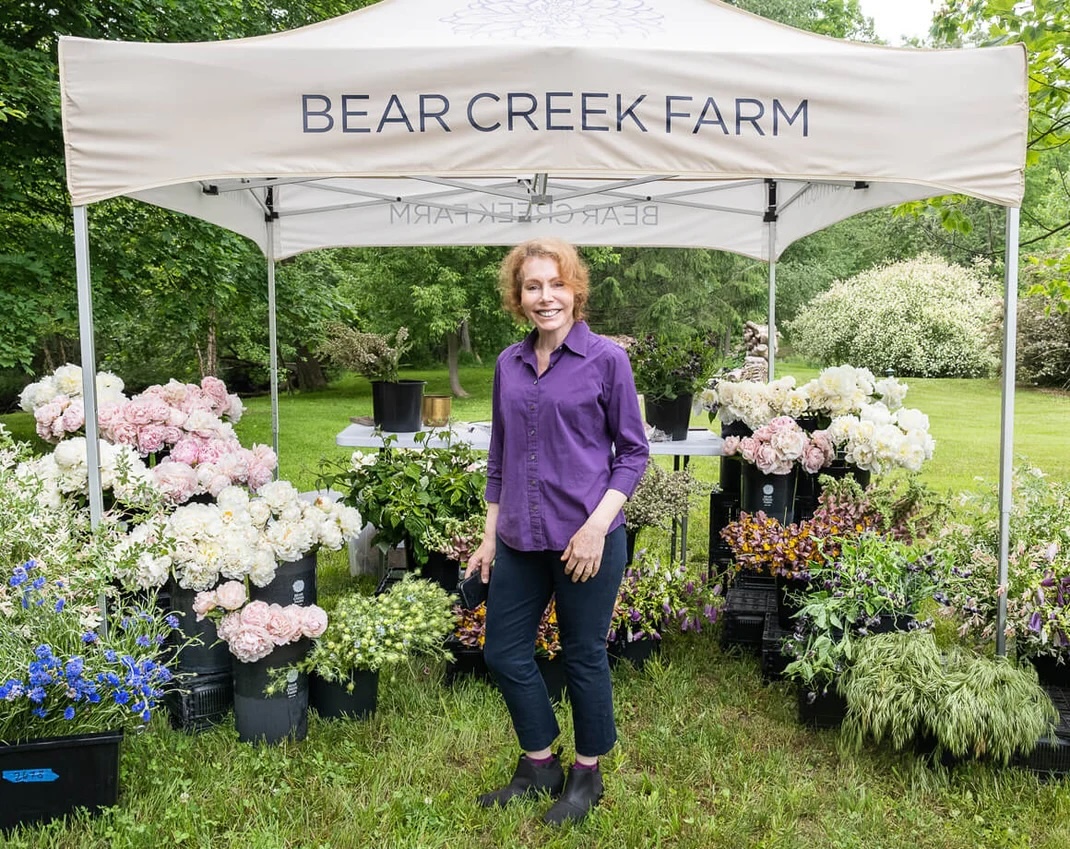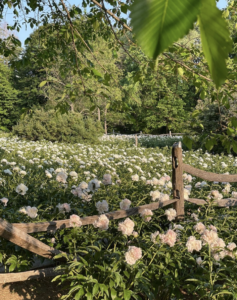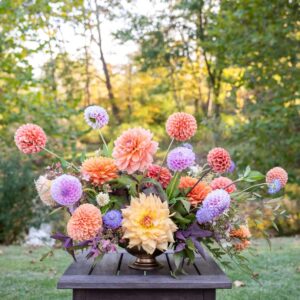Our Environment, Animal Tips & the Great Outdoors

Bear Creek Farm Nurtures Beauty from the Ground Up
“Up to this point, I had a black thumb,” laughed Debra Kaye, owner of Bear Creek Farm in Stanfordville, NY.
Bear Creek Farm first began when Debra was getting married in 2013 and needed someplace to get flowers from for the wedding. She asked a friend who owned a flower shop in Southampton, but he declined because Stanfordville was too far away for him to deliver. Instead, he urged Debra to start growing her own flowers on her land.
“So I said, ‘Okay, what do I do?’”
She started with hydrangeas, cosmos, and the flower that has become most popular at Bear Creek Farm, dahlias.

Debra was told that dahlias have a lot of problems – from collapsing stems to a variety of different diseases that the flower is particularly susceptible to. Debra’s background is in marketing and innovation, so she “wanted to solve these problems.”
The following year, she set up a field on her property and planted over 300 dahlias. From there, she did a lot of research, and set out to solve as many of the problems that she could to ensure that she would have a fruitful crop.
“The year after that I set up an even bigger field thinking it would be a hobby,” she said. “Little did I know, I became a farmer.”
Bear Creek growth
Bear Creek Farm has grown from three hundred dahlias to 12 acres of flowers. Debra said that her professional background has aided the farm in experimenting and trying new things season after season.
“The whole farm is built on the idea of integrating the farming spaces with the living spaces,” she explained. “Gardening lowers your anxiety levels and your blood pressure and being among the flowers is so beautiful. We don’t want to keep it separate.”
This year, Bear Creek is experimenting with planting shorter perennials amongst the taller perennials to reduce the amount of soil erosion as the roots stabilize in the soil. By planting shorter perennials amongst the taller ones, they won’t have to weed as frequently because they’re effectively blocking out the space where the weeds would otherwise grow.
“There are other benefits to perennial ground covers among regular perennial crops besides soil issues. Ground covers provide habitat for beneficial insects, which can help control pest populations,” Debra said. “There is also an aesthetic value, you can create a textured, layered landscape, which can give a more lush feel to your fields.”
They’re also experimenting with brix molasses, which is a plant additive made from unsulphured sugar cane molasses. The additive changes the sugar content in the flowers to make it less appealing to insects, therefore protecting the quality of the flower.
“We use all organic products, but if this is successful, it might mean that we can do away with our organic products too.”
 Additionally, Debra shared that she’s been told that Bear Creek is one of the only farms doing the traditional method of growing heirloom chrysanthemums, which consists of putting each chrysanthemum down to no more than three stems and growing them to the largest size possible.
Additionally, Debra shared that she’s been told that Bear Creek is one of the only farms doing the traditional method of growing heirloom chrysanthemums, which consists of putting each chrysanthemum down to no more than three stems and growing them to the largest size possible.
Challenges and rewards
Like all farms in the area, the drastic changes in weather in the past few years took a significant toll on Bear Creek Farm.
In 2022, the drought caused a lot of damage to the flowers. Certain flowers, such as zinnias and cosmos, do okay with high heat and little water, but Debra said that a large crop of dahlias suffered from the lack of rain.
Luckily, in 2023, Bear Creek didn’t lose any crops due to the excess of rainfall. “We’re blessed with amazing drainage on our property, so we were able to get through it.”
However, a different crisis plagued Bear Creek throughout the 2023 season. “We received a lot of the wrong product from our suppliers, and the issue with that is that you don’t know that it’s the wrong product until it blooms,” she said. “I really care about our brand, so it unfortunately wasn’t sellable for us.”
In marketing, Debra shared that once she fixed a problem, she typically didn’t have to worry about it again. “Here when you fix a problem, another one that you never thought of pops up. It’s a constant struggle that way. Also in farming, you’re constantly feeling understaffed and overworked. I’ve felt that here much more than in any other profession I’ve worked in.”
The biggest reward for Debra came during the pandemic.
“People were so cooped up in their homes and handing them a bouquet when they would come for pickup, it would bring such joy to people’s faces. During the pandemic, some people would even start to cry,” she said. “The gratification is so much bigger when you see that joy in someone’s face and it just changes your day completely. It’s astonishing.”

CSA Program
Like many farms now, Bear Creek also has a community supported agriculture (CSA) program. Prior to the pandemic, Bear Creek was 100% wholesale, but when that market declined because of the pandemic, Debra found herself with a variety of flowers and nowhere to send them.
“What we like to do is partner with not-for-profit organizations and have the CSA available at those locations,” she explained. “That way, the organizations also get a percentage of our sales.”
Currently, they partner with the Historical Society in Greenwich, CT, and the Darien Library in Darien, CT. They also have CSA pick-up locations at Union Square Market in Manhattan and at the farm in Stanfordville.
“It’s been a bit rough with the CSA because people are traveling more now and they don’t want to commit to a flower subscription. I’m seeing it’s a bit harder to do now. It’s stable, but I’m not seeing the growth in the subscription that I would hope to see.”
Looking forward
One of Debra’s long-term goals is to ensure that the people who are working on the farm become its owners in the future.
In addition to that, she is constantly adapting and trying to figure out ways to protect the farm against climate change and its many effects. “I’m always trying to figure out where the areas where we can do better are,” she said. “I’m not going to build high tunnels and do all of my gardening indoors because I believe that the plants do better outside and they need to be open to the elements.”
Throughout the process of expanding Bear Creek Farm, Debra has realized just how difficult farming can be. “Farming is a full-time job. It takes over your life in a lot of ways, but it’s such a lovely thing.”
To learn more about Bear Creek Farm, visit their website here, or follow them on Instagram here.


